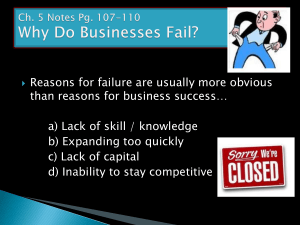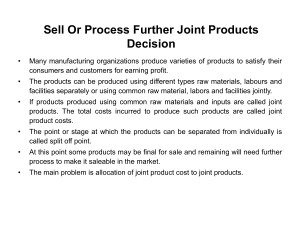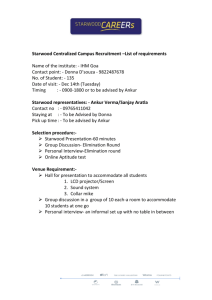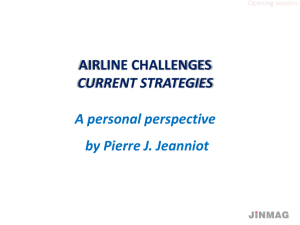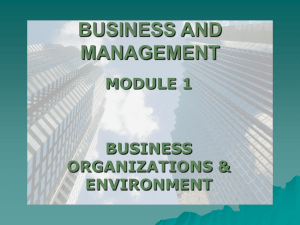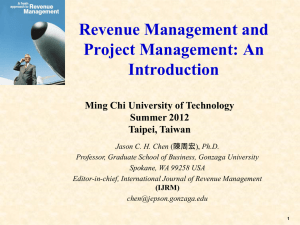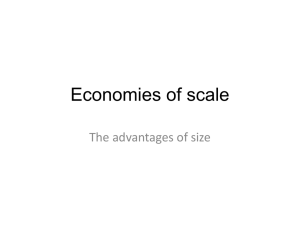Why Service Stinks
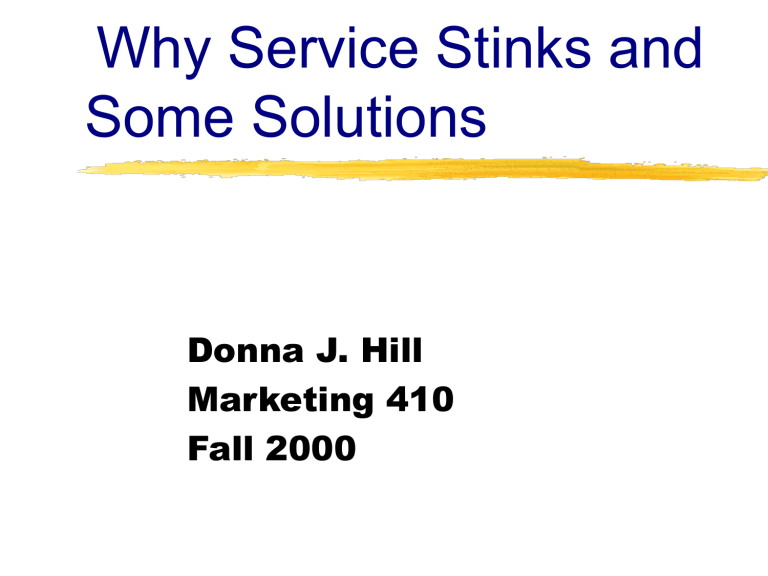
Why Service Stinks and
Some Solutions
Donna J. Hill
Marketing 410
Fall 2000
In a Nutshell
Companies know just how good a customer you are--and unless you're a high roller, they would rather lose you than take the time to fix your problem
An Example
At an electric utility
The top 350 business clients are served by six people.
The next tier of 700 are handled by six more,
30,000 others get two reps to serve their needs.
Meanwhile, the 300,000 residential customers at the lowest end are left with an 800 number.
“No one is ignored, but our biggest customers certainly get more attention than the rest.''
Students Taking This Class
Know Why
As time goes on, service gap is growing wider.
Studies vividly detail what consumers already know: Good service is increasingly rare.
“From passengers languishing in airport queues to bank clients caught in voice-mail hell, most consumers feel they're getting squeezed by Corporate America's push for profits and productivity.”
The result is more efficiencies for companies--and more frustration for their less valuable customers.
''Time saved for them is not time saved for us,''
The New Consumer
Apartheid
Andrew Chan's experience with Ikea is typical. The
Manhattan artist recently hauled a table home from an Ikea store in New Jersey only to discover that all the screws and brackets were missing .
When he called to complain, the giant furniture retailer refused to send out the missing items and insisted he come back to pick them up himself , even though he doesn't own a car. Maybe he just reached the wrong guy, says Tom Cox, customerservice manager for Ikea North America, noting that the usual procedure is to mail small items out within a couple of days.
NO ELEPHANT?
Life isn't so tough for everyone, though. Roy Sharda, a Chicago Internet executive and road warrior is a
''platinum'' customer of Starwood Hotels & Resorts
Worldwide. When he wanted to propose to his girlfriend, Starwood's Sheraton Agra in India arranged entry to the Taj Mahal after hours so he could pop the question in private . Starwood also threw in a horse-drawn carriage, flowers, a personalized meal, upgrades to the presidential suite, and a cheering reception line led by the general manager. It's no wonder Sharda feels he was ''treated like true royalty.''
How You Can Get Stiffed
FLYING
Canceled flight? No problem. With top status, you're whisked past the queue,handed a ticket for the next flight, and driven to the first-class lounge.
BILLING
Big spenders can expect special discounts, promotional offers, and other goodies when they open their bills. The rest might get higher fees,stripped-down service, and a machine to answer their questions
BANKING
There's nothing like a big bank account to get those complaints answered and service charges waived every time. Get pegged as a money-loser, and your negotiating clout vanishes
LODGING
Another day, another upgrade for frequent guests. Sip champagne before the chef prepares your meal. First-time guest? So sorry.
Your room is up three flights and to the left
RETAILING
Welcome to an after-hours preview for key customers where great sales abound and staff await your every need. Out in the aisles, it's back to self-service
_ _ _ _ _ _ _ _ _ _ _ _ _ _ _ _ _ _ _ _ _ _ _ _ _ _ _
The dark side of the technology boom
Consumers have become commodities to pamper, squeeze, or toss away, according to Leonard L. Berry, marketing professor at Texas A&M University. He sees ''a decline in the level of respect given to customers and their experiences.''
Technology is creating a radical new business model
Companies can measure exactly what service costs on an individual level and assess the return on each dollar.
They can know
exactly how much business someone generates,
what he is likely to buy,
and how much it costs to answer the phone.
The Expanded 80/20
Pyramid
Deliver a level of service based on each person's potential to produce a profit--and not a single phone call more.
One estimate is that the top 20% of customers at a typical commercial bank generate up to six times as much revenue as they cost, while the bottom fifth cost three to four times more than they make for the company.
Stratification
The top tier may enjoy an unprecedented level of personal attention. But those who fall below a certain level of profitability for too long may find themselves bounced from the customer rolls altogether or facing fees that all but usher them out the door.
An Alternative---Create
Tiers With Fees
Companies may offer to move people to the front of the line for a fee.
''There has been a fundamental shift in how companies assess customer value and apply their resources,''
Managers increasingly treat top clients with kid gloves and cast the masses ''into a labyrinth of low-cost customer service where, if they complain, you just live with it.''
Two Trends: Across
Businesses and the Web
It has become much easier to track and measure individual transactions across businesses .
Second, the Web has also opened up options.
People can now serve themselves at their convenience at a negligible cost, but they have to accept little or no human contact in return.
Such huge savings in service costs have proven irresistible to marketers, who are doing everything possible to push their customers--especially lowmargin ones--toward self-service.
Almost everyone is doing it.
Charles Schwab Corp.'s top-rated Signature clients--who start with at least $100,000 in assets or trade 12 times a year-never wait longer than 15 seconds to get a call answered, while other customers can wait 10 minutes or more.
At Sears, Roebuck & Co., big spenders on the company's credit card get to choose a preferred two-hour time slot for repair calls while regular patrons are given a four-hour slot.
Maytag Corp. provides premium service to people who buy pricey products such as its front-loading Neptune washing machines, which sell for about $1,000, twice the cost of a top-loading washer. This group gets a dedicated staff of
''product experts,'' an exclusive toll-free number, and speedy service on repairs. When people are paying this much, ''they not only want more service; they deserve it,'' says Dale
Reeder, Maytag's general manager of customer service.
Three Company Issues
Customers don't like to know they're being treated differently.
Taking service away from the low spenders doesn't generate much positive press for companies.
Most programs fail to measure the potential value of a customer.
Your mission or vision may conflict.
Is this service divide fair?
companies insist they simply can't afford to spend big bucks giving every customer the hands-on service of yesteryear.
In many cases, the trade-off in service means lower prices.
Consumers themselves have cast a vote against high-quality service by increasingly choosing price, choice, and convenience over all else
However, while many consumers refuse to pay more for service, they're clearly dismayed when service is taken away.
Sense of Entitlement?
Consumers are much more demanding about getting what they want.
Reasons:
One reason is the explosion of choices,
with everything from hundreds of cable channels to new players emerging from deregulated industries like airlines and telecom companies.
Rewards programs
frequent-flier miles: Those who know their worth expect special privileges that reflect it. Says Bonnie S. Reitz, senior vice-president for marketing, sales, and distribution at Continental Airlines Inc.:
''We've got a hugely educated, informed, and more experienced consumer out there now.''
Ethics and Privacy
Based on a wealth of personal information
It threatens to become an intensely personal form of ''redlining''-the controversial practice of identifying and avoiding unprofitable neighborhoods or types of people.
New tiers are not only highly individualized but they are often invisible.
You don't know when you're being directed to a different telephone queue or sales promotion. You don't hear about the benefits you're missing. You don't realize your power to negotiate with everyone from gate agents to bank employees is predetermined by the code that pops up next to your name on a computer screen.
An Example
Steve Reed, a West Coast sales executive, was shocked when a United Airlines Inc. ticketing agent told him:
''Wow, somebody doesn't like you.'' Not only did she have access to his Premier Executive account information but there was a nasty note about an argument he had had with a gate agent in San Francisco several months earlier. In retrospect, he feels that explained why staff seemed less accommodating following the incident. Now, Reed refuses to give more than his name for fear ''of being coded and marked for repercussions.''
PIGEONHOLING
.
The Consumers Union points out that it's unnecessary to fill out surveys with warranty cards. Just send in a proof of purchase with your name and address. ''Protecting your privacy is a significant tool to prevent yourself from being pigeonholed as undesirable,'' says Gene
Kimmelman, Washington co-director for the CU. It's equally important to recognize what kind of information companies are looking for. If you don't live in an upmarket Zip Code, consider using your work address for correspondence. Be optimistic when estimating your income or spending: The better the numbers look, the better you'll be treated.
Your Actual Payment
Record
Check for mistakes: pull your credit history at least once a year to check if there are any liens or mistakes. ''You may discover that you're listed as having missed a payment that you thought you made on time,''
The three main reporting bureaus--Experian,
Trans Union, and Equifax--charge a small fee for a copy of your credit history. If, however you have recently been denied credit, employment, or insurance, such a report is free from all three companies .
Credit Cards
Multiple credit cards can be a mistake, especially if they're the no-frills variety that are frequently offered to less desirable candidates. Not only can they drain the credit you might need for other activities, but they're also unlikely to propel you into a higher category. Using a spouse's card or account is also to be avoided, because it robs you of a chance to build your own credit history. If a mistake is made on your account, fight it.
Calling A Service Center?
Pros disagree on tactics for bypassing the service maze. One customer representative argues that when calling a service center it's better to punch in no account number if you're a low-value customer. The reason? Without proper identification, he says, a live person has to get on the line. ''Pretend you're calling from a rotary phone,'' he advises. But another tactic may be to punch zero or choose an option that's likely to get
Perception is Everything!
In the end, resistance may be futile, and the best strategy for beating the system may be to join it. Shop around for the best company, and try to consolidate your business there. These days, the best way to ensure good service is to make yourself look like a high-value, free-spending customer.
Making the Grade:
H
ow to get better service
CONSOLIDATE YOUR ACTIVITIES
Few things elevate status and trim costs like spending big in one place. Be on the lookout for packages or programs that reward loyal behavior.
PROTECT YOUR PRIVACY
Avoid surveys and be frugal with releasing credit-card or Social Security information. The less companies know, the less they can slot you.
JUMP THE PHONE QUEUE
If you want to reach a live human, don't admit to having a touch-tone phone at the prompt. Or listen for options that are less likely to be handled automatically.
FIGHT BACK
If you feel badly treated, complain. Make sure management knows just how much business you represent and that you're willing to take it elsewhere.
Segmentation Pays
Continental Airlines Inc. has started rolling out a Customer
Information System where every one of its 43,000 gate, reservation, and service agents will immediately know the history and value of each customer.
A so-called intelligent engine not only mines data on status but also suggests remedies and perks, from automatic coupons for service delays to priority for upgrades, giving the carrier more consistency in staff behavior and service delivery.
The technology will even allow Continental staff to note details about the preferences of top customers so the airline can offer them extra services.
As Vice-President Reitz puts it: ''We even know if they put their eyeshades on and go to sleep.'' Such tiering pays off. Thanks to its heavy emphasis on top-tier clients, about 47% of
Continental's customers now pay higher-cost, unrestricted fares, up from 38% in 1995.
How It Works!
At All First Bank in Baltimore, only those slotted as top customers get the option to click on a Web icon that directs them to a live service agent for a phone conversation. The rest never see it.
First Union, meanwhile, codes its credit-card customers with tiny colored squares that flash when service reps call up an account on their computer screens .
Green means the person is a profitable customer and should be granted waivers or otherwise given white-glove treatment.
Reds are the money losers who have almost no negotiating power, and yellow is a more discretionary category in between.
''The information helps our people make decisions on fees and rates,'' explains First Union spokeswoman Mary Eshet.
'We're Sorry, All of Our Agents Are
Busy with More Valuable
Customers'
CODING
Some companies grade customers based on how profitable their business is. They give each account a code with instructions to service staff on how to handle each category.
ROUTING
Based on the customer's code, call centers route customers to different queues. Big spenders are whisked to high-level problem solvers. Others may never speak to a live person at all.
TARGETING
Choice customers have fees waived and get other hidden discounts based on the value of their business. Less valuable customers may never even know the promotions exist.
SHARING
Companies sell data about your transaction history to outsiders. You can be slotted before you even walk in the door, since your buying potential has already been measured.
Fees A Solution---?
Innovative players are striving to use their treasure trove of information to move customers up the value chain instead of letting them walk out the door.
Capital One Financial Corp. of Falls Church, Va., is an acknowledged master of tiering, offering more than 6,000 credit cards and up to
20,000 permutations of other products, from phone cards to insurance.
That range lets the company match clients with someone who has appropriate expertise. ''We look at every single customer contact as an opportunity to make an unprofitable customer profitable or make a profitable customer more profitable,'' says Marge Connelly, senior vicepresident for domestic card operations.
What Will Future Hold?
What Are Some Solutions?
Deliver a level of service based on each person's potential to produce a profit
Explain the different levels of service and fees costs associated with them (education)
Make the invisible visible
What the customer gets as well as how they get it are important
Two types of quality
regular and handling of problems
Think potential and long-term
The Final Solution
Although the level and type of service may vary, quality of service should always be uncompromising---
Promptness, Courtesy, Cleanliness, and
Appreciation for Business are always expected.
What do I expect if I buy a $1500 suit at Bijan’s on
Hollywood’s Rodeo Drive?
What do I expect if I buy a $150 suit off the rack at a discount store?
Note: I don’t expect worse service at the discount store --- I expect less of it.
In Conclusion
The customer is the ultimate boss. He can fire everyone on down, just by spending his or her money elsewhere.
How to Improve Your Profile
Information can be used for or against you.
Be stingy with the information you give out--especially if it's unlikely to help your status. Don't fill out surveys, sweepstakes forms, or applications if you're not comfortable with how the information might be used. Be wary when a company asks if it can alert you to other products and services. A yes may permit them to sell data that you don't want distributed.
